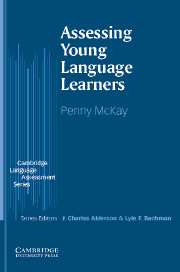Book contents
- Frontmatter
- Contents
- Series editors' preface
- Acknowledgments
- 1 A special case for young learner language assessment
- 2 Young learners and language learning
- 3 Research into the assessment of young language learners
- 4 Assessing language use through tasks
- 5 Classroom assessment of language use
- 6 Assessing oral language
- 7 Assessing reading and writing
- 8 Evaluating young learners' performance and progress
- 9 Testing young language learners through large-scale tests
- 10 The way forward
- References
- Index
- Publishers' acknowledgments
3 - Research into the assessment of young language learners
Published online by Cambridge University Press: 04 May 2010
- Frontmatter
- Contents
- Series editors' preface
- Acknowledgments
- 1 A special case for young learner language assessment
- 2 Young learners and language learning
- 3 Research into the assessment of young language learners
- 4 Assessing language use through tasks
- 5 Classroom assessment of language use
- 6 Assessing oral language
- 7 Assessing reading and writing
- 8 Evaluating young learners' performance and progress
- 9 Testing young language learners through large-scale tests
- 10 The way forward
- References
- Index
- Publishers' acknowledgments
Summary
The aim of this chapter is to outline the scope of recent research into the assessment of young language learners. The chapter is also designed to help teachers and assessors to identify the directions in which research is currently going, and those that are waiting to be pursued. It is very clear that there are many questions still to be answered, but that there are some pockets of strong research activity in relation to selected areas of young learner assessment, in particular, teacher-based assessment.
Research into the assessment of young learners is a new field of endeavour, and whilst there has been relatively little published research to date, a growing amount of work is being undertaken by researchers and teachers around the world. The main source of information about research is professional journals, where researchers, often academics in tertiary institutions around the world, publish their work. Sometimes the findings of research are available within reports from government agencies such as the Council of Europe, Language Australia, and the National Centre for Research on Evaluation, Standards and Student Testing (CRESST) in the United States. Teachers' work is sometimes published in government-sponsored educational publications, or included in academic research articles in journals. Recently research into young learner assessment has been more evident because of the following: firstly, increased numbers of researchers, particularly in Europe, sharing their findings in commercial publications; secondly, the impetus of the standards movement (the introduction by governments of external criteria of learning known as standards, as both curriculum guides and accountability measures) which has provided a focus for reflection and empirical research into language proficiency pathways, and thirdly, arising out of the latter, increased research activity into teacher-based formative assessment in the classroom.
- Type
- Chapter
- Information
- Assessing Young Language Learners , pp. 61 - 96Publisher: Cambridge University PressPrint publication year: 2005



